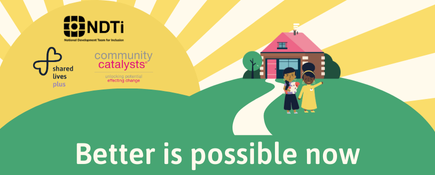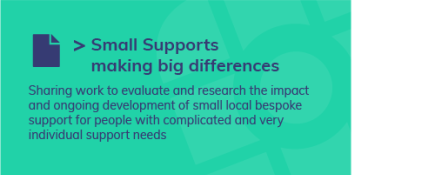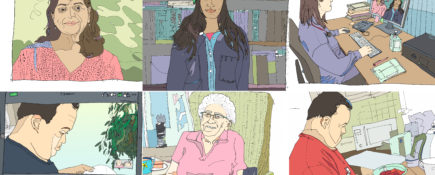
Small Supports, big changes: Transforming lives in Leeds
What happens when you reimagine adult social support from the ground up? Dr Vicky Mason-Angelow shares what happened in Leeds following a two year pilot.

These pressures include changing expectations of people who use services (usually aspirational, sometimes generational, sometimes short breaks focused); a real desire to give people more choice and control over the services and support they receive; a policy focus on working more closely with communities, providing support to people who have and pool individual budgets; and, of course, funding pressures.
Exploring these pressures in more detail highlights a number of fundamental issues and opportunities:
Whilst the detail for each ‘client’ group and for each kind of organisation (voluntary, charitable, statutory) may be different, these pressures and opportunities are common. The answers will be too. Working together with colleagues, people using services, and communities from the whole sector locally will help ensure the future day time support offered is seamless and robust enough to last.
We know that there are good people providing and commissioning day time supports, and that there are useful working practice and tools. However, too many of these people are working in isolation and so don’t have the time for creative thinking, idea sharing and development opportunities. Some face opposition; others, a competitive environment.
NDTi works with local providers, commissioners and others to design and deliver bespoke reviews, development programmes, change management, and workforce development. We tailor the support we offer to the context and needs of the area, with a view to ensuring that local support and provision enables the people you support to live good and connected lives in their own communities.

What happens when you reimagine adult social support from the ground up? Dr Vicky Mason-Angelow shares what happened in Leeds following a two year pilot.

See the person …not a problem needing fixing. Nic Crosby, Small Supports, and Amanda Nally, Community Led Support, explore the need for services to challenge themselves. Are they truly person-centred, or, is it just nice...

Anonymous guest blog: How small acts can make a big difference to neighbours, individuals and communities Winston and Marva live opposite me in one of the Victorian spec. built terraced houses that you see in...

We're delighted to be collaborating with Shared Lives Plus and Community Catalysts on a campaign to highlight a range of proven approaches that are reshaping conversations about social care. Better Now focuses on the transformative...

NDTi associate Jackie Claxton-Ruddock shares why Black History Month is important. Together with with Shelley Hayles, from LeeAnna's Wish, they explore the intersectionality of being black and disabled in the community.

Dr Vicky Mason-Angelow, research and evaluation manager at NDTi, shares insights from a study into the impact of Small Supports organisations.

Your vote counts. Two of our programmes have been shortlisted for an award: Small Supports for a service delivery award. The evaluation of Community Led Support, with the University of Birmingham, for a research and...

Better is possible now is a shared call to action from NDTi, Community Catalysts and Shared Lives Plus spotlighting existing models that are already working.

Jenny Pitts, programme lead for the Community Led Support programme, reflects on her own learning from the last decade and what it really takes for local areas to make a success of embedding a strengths...

As part of our seasonal 12 days of human rights campaign, Nic Crosby, Lyn Griffiths and Amanda Nally share their thoughts around person centred planning. 12 days of human rights, day 2: Person centred planning...

The NDTi Wellbeing Questions Framework is a tool designed to measure key aspects of wellbeing relevant to social care and quality of life.

This report by Dr Victoria Mason-Angelow documents the work and the outcomes undertaken in Leeds by the City Council and ICB partners to develop new small support organisations for people with learning disabilities and/or autistic...

In 2024 we published an independent report of a two-year study undertaken by a collaboration of universities, and funded by the National Institute for Health and Care Research (NIHR), on the impact of Community Led...

We are sharing work to evaluate and research the impact and ongoing development of small local bespoke support for people with complicated and very individual support needs. Three new pieces of work, shared online in...

This report covers in depth research about advocacy for people with a learning disability and autistic people who are inpatients in mental health, learning disability or autism specialist hospitals.

Resources for health and care professionals, detailing the “Whole Family Approach” to Person Centred Care.

This report presents details of the evaluation of the Small Supports programme, delivered in partnership between NDTi, Beyond Limits, C-Change and Positive Support for You, funded by NHS England and the Local Government Association. The...

NHS 111 First When the NHS 111 first campaign launched, we at the Valuing People Alliance (NDTi, LDE and BILD) decided we wanted to know what impact this might have on people with learning disabilities...

Adjusted care resources to support health and care workers

Improved wellbeing, reduced social isolation, a better place to grow older and reduced costs to health and social care.
Madeline Cooper
Email: Madeline.Cooper@ndti.org.uk
Thank you for taking the time to subscribe.